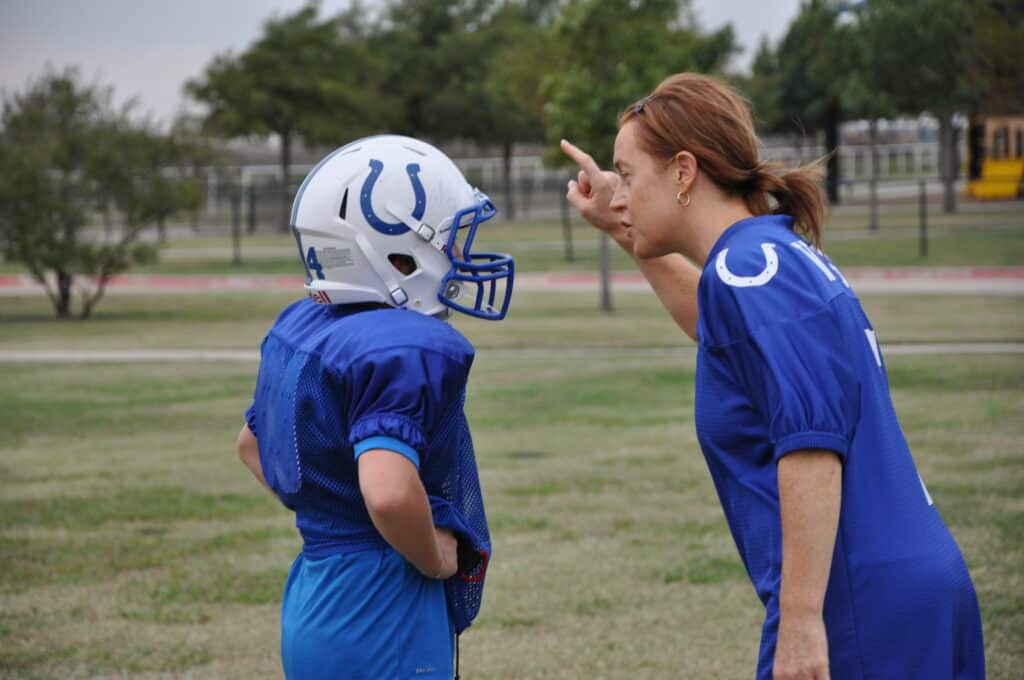Parenting Athletes: 5 Actions to Improve Mental Toughness
Developing mental toughness in our kids means allowing them to struggle. When we rescue or protect our kids from anxiety and the natural consequences of mistakes, then we develop mentally soft individuals who are needy.
It may come as a surprise to you, but anxiety does not mean there is something wrong with your child or that they have ‘mental health’ issues. Very few kids ‘have anxiety’. It is a normal human feeling and experience. Perhaps your child needs to face the situation and learn to overcome.
Every week, I hear stories of parents who intercede for their kids and damage the natural process of growth, mental toughness, and confidence. Most of the time parents do not realize the crippling effect of their actions. They think they are helping, but their actions often remove learning and managing negative emotions. They negate empowerment and personal responsibility. It creates fragile people who can not stand and deal with the most basic problems of life.
If you want to raise mentally tough athletes, then employ these 5 actions:
1. Have your child communicate with the coach
As a parent, there is no need to talk to the coach about field time, skills, or technique. Let your child communicate and ask questions if they want to improve, see more play time, or start. Mental toughness develops in your child by him or her approaching the coach, looking in their eyeball even though scared and asking their questions.
2. Give your child responsibilities at home
Kids of all ages need responsibility for their things and the family home. Toddlers can get their athletic bag ready, pick up toys and belongings, load the dish washer, and learn to clean floors (they are lowest to the ground). As they grow older, and by the adolescent and teen years, they obviously can do more: sweep, mop, dust, pet care, laundry start to finish, and yard work. Cancel the house cleaner and yard service and put your mentally tough children to work!
3. Allow the consequences of forgetting
If your kid forgets an assignment, their lunch, their sports equipment, or band instrument, DO NOT bring it to them. Allow the consequences of forgetting. To suffer this pain develops the resilience and mental toughness you want in your offspring. Following the consequences, help them to learn from the unintentional mistake. Assist with a plan to prepare and prevent it from happening again.
4. Discipline by doing rather than taking away
If your athlete disobeys rules and authority in some way, instead of taking something away, have him or her DO something. The first time one of my teenagers lied to me, I called a single friend and left my kid at her place at 8:00am on a Saturday morning. After 8 hours of yard work, trash bags full of acorns and weeds, my child got the message about lying. A few months later when damage was done to my SUV, this same child promptly told me rather than avoiding or lying about it. It takes mental toughness to admit big mistakes, promptly own them, and ask forgiveness.
5. Focus on teaching life skills
Your job is to help your athlete develop the life skills needed for the reality of life rather than focusing on winning and statistical outcomes. Most of you want such things as honesty, respect for authority, discipline, teamwork, leadership, communication, motivation, managing emotions, resilience, and confidence, right? Their mental toughness will soar as they learn these life skills and to do the things they are anxious about rather than avoiding. And, bonus, your stress will lower as they improve their mental toughness.
Bottom line, honor the struggle to mature rather than rescue or protect them from the pain of the process. As adults, you know challenges and problems do not stop. They keep coming. Sports involvement and your parenting provide the means to become mentally tough individuals. If you need some solid resources to help you in your journey as a parent of an athlete, I highly recommend Amy Morin's book 13 Things Mentally Tough Parents Don't Do, and the unending resources at Positive Coaching Alliance.

 Parenting athletes is hard work. There's an entirely new and different set of dynamics at work. You have to be mom, dad, or mom and dad, coach, counselor, EMT, equipment manager, engineer, and seamstress all before dinner! You're not alone and maybe, just maybe, we can help each other navigate this never-ending path to glory. Hey, what's your biggest challenge with your athlete?
Parenting athletes is hard work. There's an entirely new and different set of dynamics at work. You have to be mom, dad, or mom and dad, coach, counselor, EMT, equipment manager, engineer, and seamstress all before dinner! You're not alone and maybe, just maybe, we can help each other navigate this never-ending path to glory. Hey, what's your biggest challenge with your athlete?

